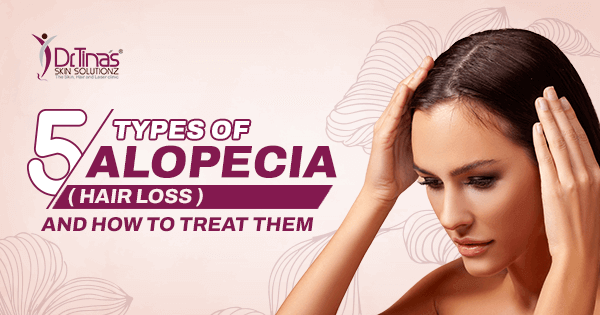5 Types of Alopecia (Hair Loss) and How to Treat Them
Five Types of Alopecia (Hair Loss) and How to Treat Them

Recently, Nithin noticed his hairline starting to recede. At just over twenty years old, this has significantly impacted his self-confidence. Whether in his personal life or professional environment, Nithin feels less sure of himself. Unfortunately, this is a common issue for more than 80% of men and over half of women who experience some form of hair loss (or Alopecia). Fortunately, the increasing popularity of advanced hair loss treatments in Bangalore has made finding the right solution much easier.
What is Alopecia?
Alopecia is an umbrella term used to describe a condition characterized by the sudden or gradual onset of hair loss. Although Alopecia usually doesn’t indicate any other underlying health problems, it can sometimes signal internal changes in the body. There are various ways Alopecia can manifest and affect the hair.
It's important to differentiate between regular hair shedding and Alopecia. It’s normal for humans to lose between 50 to 100 hairs daily. Therefore, don't confuse normal hair loss with Alopecia.
Types of Alopecia
Alopecia varies from person to person, depending on its pattern, cause, and gender.
Androgenic Alopecia
Common in both men and women, Androgenic Alopecia typically involves a gradual thinning of hair on the scalp. It’s usually caused by genetic factors and, in some cases, environmental influences. This type of hair loss is referred to as male-pattern baldness when it occurs in men and female-pattern hair loss in women. Men often notice an M-shaped pattern of hair loss on the front and top of their scalps, which progresses into partial or total baldness. Women tend to experience widening of the central part of their hair and a general reduction in hair density on the crown. Many women retain their hairlines at the front.
Alopecia Areata
Alopecia areata is characterized by the loss of hair in round or oval patches on the scalp or any part of the body. This condition is generally an autoimmune disorder where the immune system mistakenly attacks the hair follicles. Many individuals also experience hair loss (Telogen Effluvium) following the Covid-19 pandemic. Alopecia areata can be emotionally challenging for those affected. A dermatologist might suggest waiting for the lost hair to grow back naturally before recommending treatment. Often, patients respond positively to treatments for a while, but the condition frequently recurs, so there is no permanent cure.
Alopecia Universalis
This condition involves complete hair loss from the scalp and body. Those with Alopecia universalis may experience hair loss in areas such as eyebrows, eyelashes, arms, legs, and the pubic region. This condition is a form of Alopecia areata and is more common in families with a history of alopecia.
Traction Alopecia
This condition arises when hair is pulled or stretched due to tight hairstyles like ponytails, hair extensions, and braids. Constant stretching damages the hair follicles, leading to permanent hair loss if not addressed early. Common symptoms include scalp redness, bumps, itching, and folliculitis.
Cicatricial Alopecia
One of the more severe forms of alopecia, this condition is marked by inflammation of the hair follicles, resulting in scarring. Scarring occurs due to scar tissue formation, causing permanent hair loss. Symptoms include itchiness, heat, and pustules, and diagnosis often requires a scalp biopsy.
Treatment for Alopecia
Hair loss treatments in Bangalore offer solutions for individuals dealing with various forms of this condition. Given the multiple types of alopecia, treatments also vary.
Platelet Rich Plasma (PRP)
One of the most recommended treatments for hair loss is Platelet-Rich Plasma (PRP) therapy. This procedure involves drawing, processing, and injecting the patient's plasma into the scalp. PRP has proven beneficial in promoting hair regrowth by healing scalp tissues and hair follicles. Proteins in PRP enhance the healing process, leading to regenerative outcomes.
Growth Factor Concentrate (GFC) Treatment
GFC treatment also shows promise in combating hair loss. This treatment uses highly concentrated plasma injected onto the scalp and neck to stimulate hair growth.
Corticosteroid Injections
Certain types of alopecia can be treated with corticosteroid injections. These injections are effective for treating hair loss caused by the immune system attacking hair follicles, such as Alopecia areata and Alopecia universalis. Treatment requires several sessions every 4 to 8 weeks, as recommended by the doctor.
Medical Line of Management
In addition, medical professionals recommend addressing nutritional and lifestyle factors that may contribute to hair loss. Consistent use of prescribed medications can also help reverse hair loss and promote new growth.
Since the causes of alopecia can differ, patients may respond to various treatments. While some forms may not require any intervention, others might need specialized care such as hair loss treatment in Bangalore. However, before proceeding with treatment, it’s crucial to consult an expert.

Dr. Tina Ramachander is one of the best dermatologists in Bangalore and the Medical Director at Dr. Tina’s Skin Solutionz, a skin care clinic in Bangalore. She earned her master’s degree in dermatology from the prestigious JJM Medical College in Karnataka and currently practices as a dermatosurgeon and Medical Cosmetologist in Bangalore.
Health And Medical,Quality Red Ginseng Honey Tablets,Red Ginseng Extracts,Ginseng Essence
Yanbian Dangun Pharmaceutical Co., Ltd. , https://www.tanjunpharmacy.com